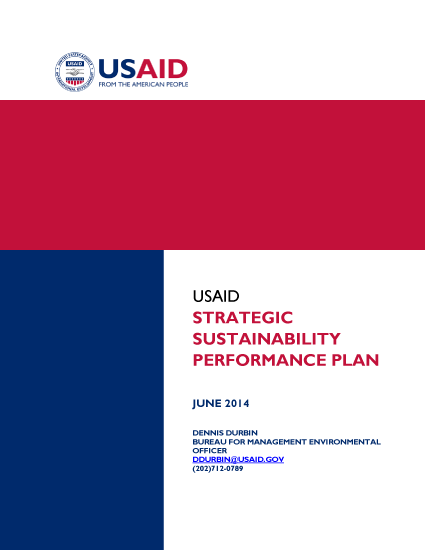Speeches Shim
Section 8 of Executive Order 13514, Federal Leadership in Environmental, Energy, and Economic Performance, requires Federal agencies to develop, implement, and annually update a multi-year Strategic Sustainability Performance Plan (SSPP). USAID has submitted SSPP’s to the Council on Environmental Quality (CEQ) and the Office of Management and Budget (OMB) annually since 2010. This document is an overview of the 2013 submission.
SECTION 1: VISION AND STRATEGY
USAID is committed to fostering a clean energy economy and to sustaining the environment by conducting operations and programs in an environmentally responsible manner, complying with environmental laws and regulations, and leading by example.
USAID’s programs operate globally and impact millions of people worldwide. In response to the growing concerns about the adverse impacts of climate change, USAID’s mission is to improve the living conditions of people in developing countries while minimizing detrimental impacts to the environment. USAID helps these stakeholders generate prosperity in innovative, and sustainable ways while conserving natural resources and minimizing contamination.
USAID’s sustainable program includes the following areas of emphasis:
- Integrating climate change adaptation strategies into USAID’s programs and operations in order to minimize risks to Agency assets and program activities
- Procuring energy efficient and environmentally preferable electronic products and utilizing sound environmental practices when disposing of those products
- Supporting green transportation and a reduction of Greenhouse Gas (GHG) emissions from employee commuting
- Designing, constructing, and operating high performance facilities and using regional and site-specific green infrastructure practices
- Development of environmental management systems for implementation at the appropriate organizational levels
- Engaging employees, stakeholders, and the public in our environmental commitment
- Reducing consumption and reliance on nonrenewable energy by promoting renewable energy projects and programs
- Promoting water conservation through identification of water inefficiencies and implementation of water conservation projects
- Implementing sustainable acquisition practices for recycled content, energy efficient, bio-based, and environmentally preferable products, and services
- Pursuing waste management strategies that include reducing, reusing, or recycling


Comment
Make a general inquiry or suggest an improvement.